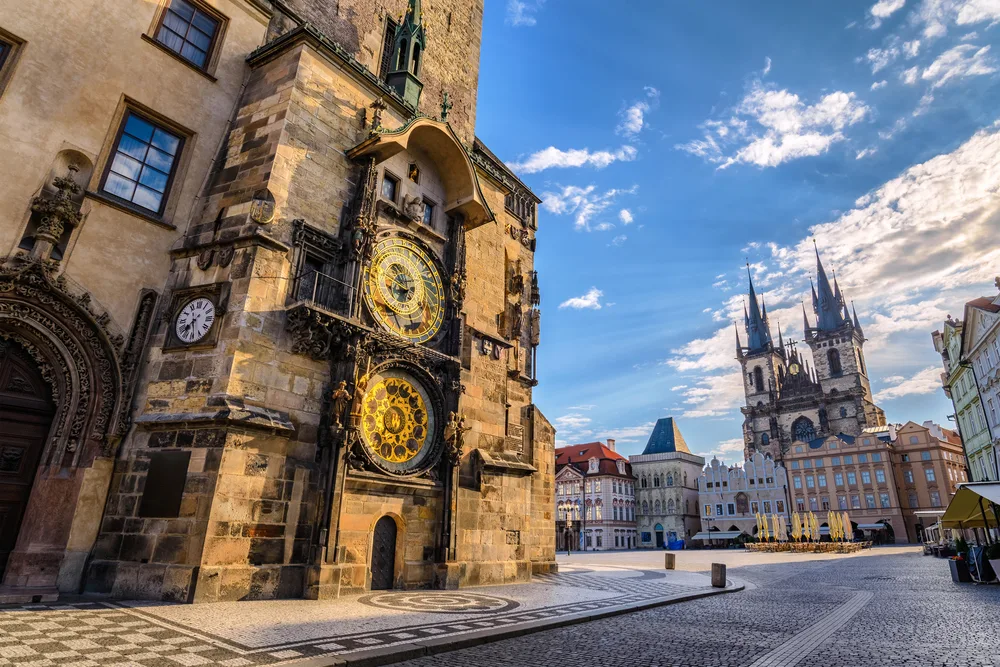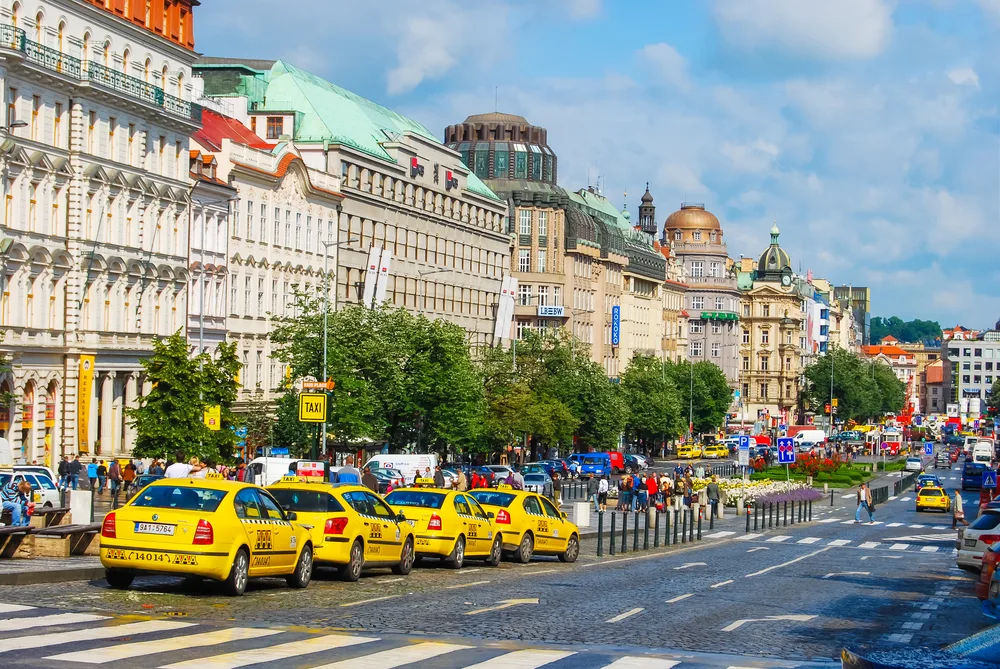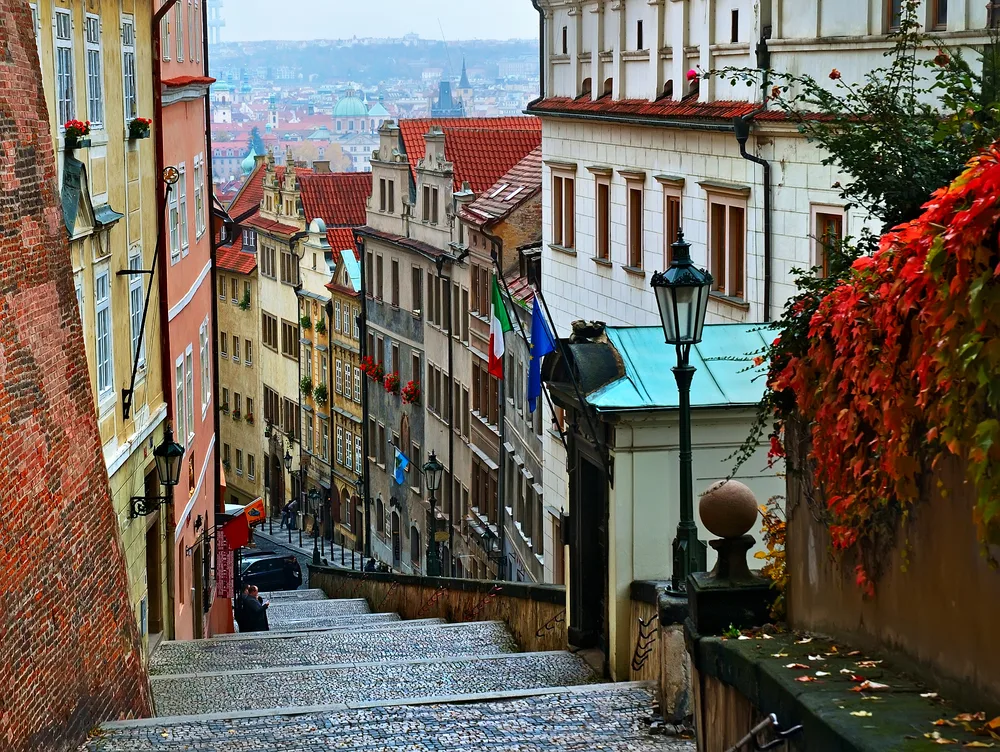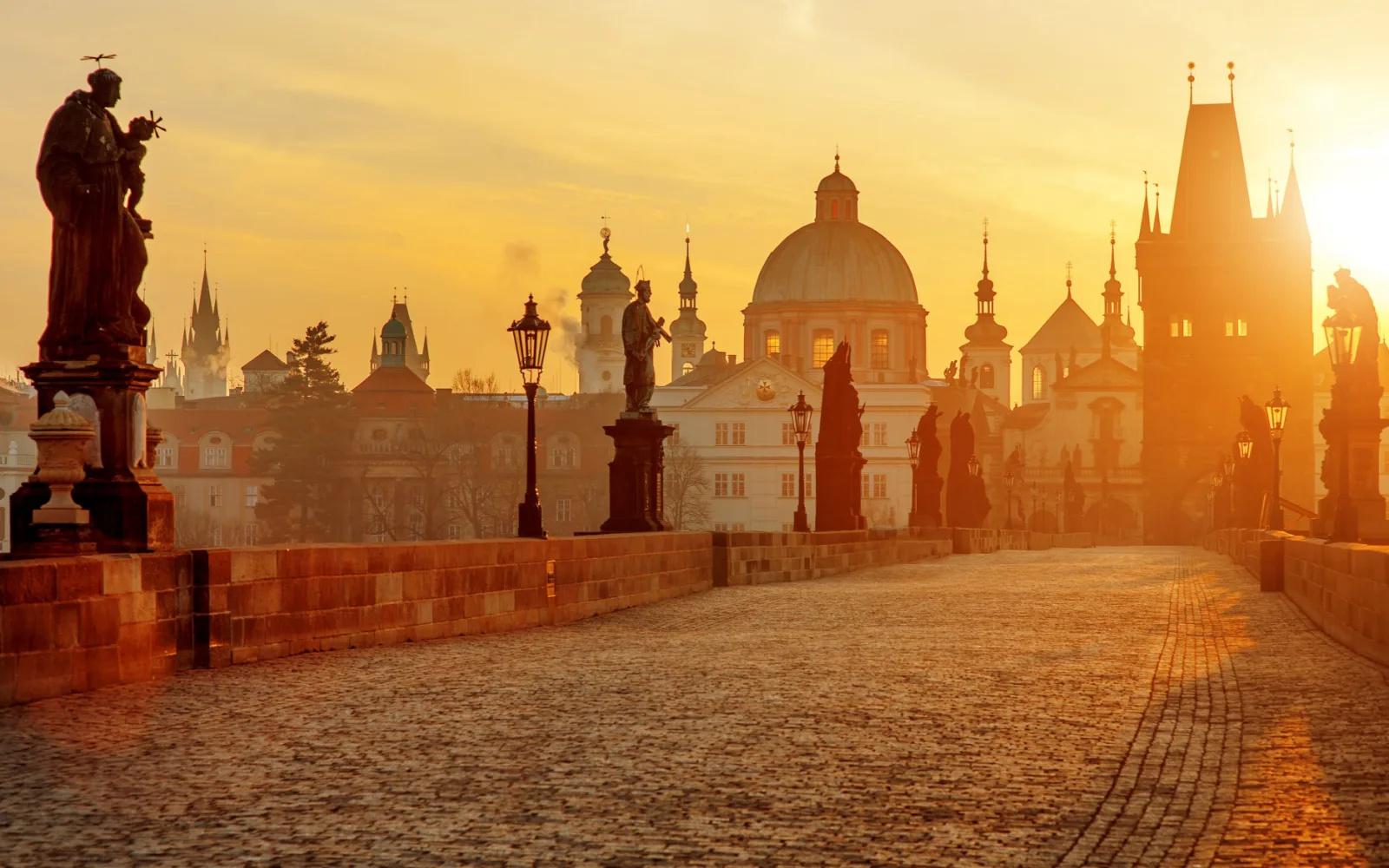Prague is one of the safest destinations in all of Europe. This idyllic capital of the Czech Republic is rapidly becoming a tourist hotspot, with millions of tourists visiting every year. The good news is it’s also extremely safe and accessible to see.
But while this storied city is rich in history, culture, and amazing architecture, is Prague safe to visit? Here’s our take.
Is Prague Safe to Visit in 2025?

Noppasin Wongchum/Shutterstock
Yes. According to the United States State Department, Prague is exceptionally safe to travel to, and visitors only need to consider basic safety precautions. In fact, it’s at the lowest threat level available in the U.S. system.
Similarly, the United Kingdom notes that most tourists have a “trouble-free” visit to Prague and mentions that you should check COVID regulations before going. Occasionally, there are some issues with public protests, for which the United States State Department has issued warnings.
If you’re concerned about the safety and want to avoid unnecessary trouble, simply register with STEP before visiting the country. You’ll get email alerts if anything is happening that you need to be aware of.
Crime in Prague
Prague is one of the safest cities in Europe, with very little violent crime. Therefore, the likelihood that you’ll run into trouble is minimal, but not totally insignificant. As such, it pays to stay aware of ordinary crimes and scams to avoid them.
Like any other large city, Prague very occasionally has terrorism issues, especially during significant events or celebrations. However, these sorts of attacks are rare and mostly on par with the kinds of problems that you’ll experience in other countries.
As far as crime goes, Prague is exceptionally safe with minimal troubles. If you encounter any issues, dial “112”, the European equivalent of “911.” Most crime involves crimes of opportunity, like pickpocketing.
You can decrease your risk of becoming a target by leaving valuables at your hotel and avoiding checking directions on your phone on the street.
Also, if you’re traveling in a crowded area, ensure your bag is firmly zipped in front of you. As long as you keep your wits about yourself and try to be a hard target, you should be completely fine in Prague.
Pickpocketing and Petty Theft
The most common crimes targeting tourists involve pickpocketing and petty theft. These crimes disproportionately happen in larger crowds and more “touristy” areas, including the places around Prague Castle, public transportation, and overnight trains.
Sometimes pickpockets will carry small knives to cut the bottom of your bag and take out valuables without you knowing. Protect yourself against these stealth attacks by always having your bag in front of your body while in large crowds and on public transportation.
Other times, criminals will work in groups. For example, one person will distract you while another will lift your cell phone or wallet. Be wary of any strange interactions and stay alert while on the streets.
You can also do the following things to keep pickpockets at bay:
- Keep your phone and wallet in a zipped purse or a front pocket, never a back pocket
- Leave your valuables at the hotel
- Don’t flash expensive jewelry
- Be aware of strangers approaching you on the street
- Separate your money and credit cards in case your wallet gets stolen
- Keep your physical passport at the hotel and only carry a copy on you
- Never keep valuables in the overhead luggage bin on public transportation
Although Prague is undoubtedly a great city where you can have a fun night out, try to avoid getting too intoxicated at night, especially if you’re carrying large sums of money or your passport.
Taxi Scams

PRAGUE, CZECH REPUBLIC – JUNE 12: Wenceslas Square, on June 12, 2009 in Prague, Czech Republic. Wenceslas Square is one of the main city squares, center of the business and culture in the New Prague/Romas_Photo/Shutterstock
Most taxis in Prague are entirely safe, but once in a while, you’ll encounter a less-than-savory situation. Taxi scams generally occur when the taxi driver doesn’t want to use the meter or takes you in a completely different direction.
So only use licensed taxis, and ask your hotel to call a cab when possible. Look for yellow taxis that are clearly marked with the word “TAXI.” The driver’s full name and identification should also be visible.
Avoiding Bad Areas
While Prague is safe overall, there are still some bad areas that you’ll undoubtedly want to avoid. Like most cities, Prague tends to get a bit more dangerous after the sun goes down.
Places like the train station can become slightly seedier in terms of petty crime like pickpocketing. There’s also a large homeless population near the Prague train station. Wenceslas Square is also a prime spot for pickpockets to gather, and it can become worse at night when there are crowds.
Popular bar districts and specific areas in the Old Town, such as near the Astronomical Clock, are not bad in and of themselves but can become hunting grounds for petty criminals.
If you visit Prague’s famous Astronomical Clock to see the show, ensure that your bag is securely in front of you. Bartolomejska, in Old Town, is a great place to go out for a cocktail but can attract bands of petty criminals at night looking for easy marks.
Also, the red light district on Perloca Street can be slightly dangerous after dark. Using common sense will go a long way in Prague.
If something seems unsafe, it’s a good idea to steer clear of it or go with a group. You generally won’t encounter any serious violent crime, but you could be unfairly targeted for being a tourist.
Things to Consider
Prague’s major problems involve scams and pickpocketing, so keeping the following things in mind will help you avoid bad situations and make the most out of your vacation:
- Leave valuables, including your passport, at the hotel.
- Only use ATMs affiliated with banks, and avoid going to ATMs in secluded places after dark.
- Use official metered taxis and Google Maps to track your progress whenever possible.
- If you need to exchange your money, do it at a designated currency exchange place.
- Stay vigilant on public transportation and always carry your bag in front of you.
- Make sure that you keep your wits about you in larger crowds.
- Drugs are illegal in the Czech Republic, so stay away from them.
- If you partake in the city’s nightlife, do so safely and avoid wandering to dark places at night.
These things will help you make the most out of your vacation and stay as safe as possible while in Prague. A little preparation and mindfulness can undoubtedly go a very long way.
Frequently Asked Questions

Ihor Pasternak/Shutterstock
It’s natural and understandable to be excited about your Prague vacation, but most travelers have a few questions and concerns about what to expect when they arrive.
These frequently asked questions and answers will help you have an excellent trip and stay respectful to your local hosts simultaneously:
Will I need an adapter?
In short, yes, you will need an adapter. Fortunately, you can get one just about anywhere. Look for adapters billed as North America to Europe, and you should be all set. Since many modern devices come with built-in surge protectors, all you need is something that will make the plug work.
European plugs have two round holes for the plug, instead of the typical three you’ll find in the U.S., and run on C/E power as opposed to A/B. If you forget to buy an adapter beforehand, you can purchase one at the airport or in almost any electronics store in the Czech Republic.
On the other hand, if you’re planning on traveling to several different parts of the world, investing in a universal adapter that fits all sockets worldwide might be helpful.
Do Americans need a visa to visit Prague?
Americans can get a visa on arrival in the Czech Republic, granting them access to the country for 90 days. You’ll need to have six months of validity on your passport, plus enough blank pages to put the stamps in.
People from other countries may have to apply for a Schengen visa, which allows them access to countries all across the European Union.
You’ll need to apply for your visa in advance if you have to do this. Make sure you apply at least a few months before your scheduled trip, as visas sometimes take quite a while to process, especially over the holidays.
How’s the public transportation system in Prague?
Prague has an excellent public transportation system, including buses and the metro. It’s well-marked, easy to navigate, and arguably the best way to get around the city, especially during rush hour.
When taking public transportation, make sure to keep your bags and valuables safely secured, with all purses and bags zipped up to avoid pickpockets. This tip is essential to remember during busy times.
The Prague metro consists of three separate lines and covers many miles of the inner and outer city. It runs between 4 a.m. and midnight every day, and no matter where you are, there’s bound to be a station near you. It’s a great way to take an informal tour of the city.
Can I get by with English in Prague?
Prague is a vast multicultural city, so most people speak English, although knowing some key Czech phrases is a good idea too. Speaking a bit of the local language shows that you respect the culture and want to communicate with people in their native tongue.
Additionally, since the Czech Republic was once part of the Soviet Union, many older people will speak Russian. Some people can speak German.
If you find yourself outside of the city in a situation where you can’t communicate, find someone who is comparably on the younger side to translate for you. Since many schools teach English as a second language, most younger people will be able to speak it.
While language barriers should not be a problem in Prague itself, especially in more tourist-oriented places, those taking side trips may encounter some issues.
What currency is used in Prague?
The Czech Crown or Koruna is the dominant currency in Prague, although you might find some places that take Euros as well. There are plenty of ATMs around Prague, so you don’t need to worry about converting your currency in advance. Depending on your bank, you could incur some fees, though.
Many places also take credit cards, although some small transaction fees could also be affiliated with them. Make sure you let your bank know you’re traveling overseas in advance because sometimes banks will freeze your cards due to suspicious activity.
Also, it’s a good idea only to use ATMs affiliated with official banks in case the machine malfunctions and “eats” your card. Avoid using ATMs in secluded areas, especially after dark, and always shield your PIN from curious onlookers.
These tips and tricks will help you make the most of your time in Prague and have a safe and enjoyable vacation.
It’s also a good idea to make a copy of your passport picture page and itinerary and give it to a trusted friend or family member back home. If you’re American, you can enroll in STEP to inform the embassy that you’ll be traveling and staying in Prague.
Book Your Trip to Prague Today!
It’s no wonder why Prague is one of the top European cities to visit; it’s exceptionally safe and a lovely place to spend your vacation. The only things you have to worry about are taxi scams and pickpocketers, but as long as you keep your wits about yourself, you should be fine.
If you’ve been holding off on booking your dream Prague vacation, now is the time to do it. So what are you waiting for — book your trip to Prague today!



